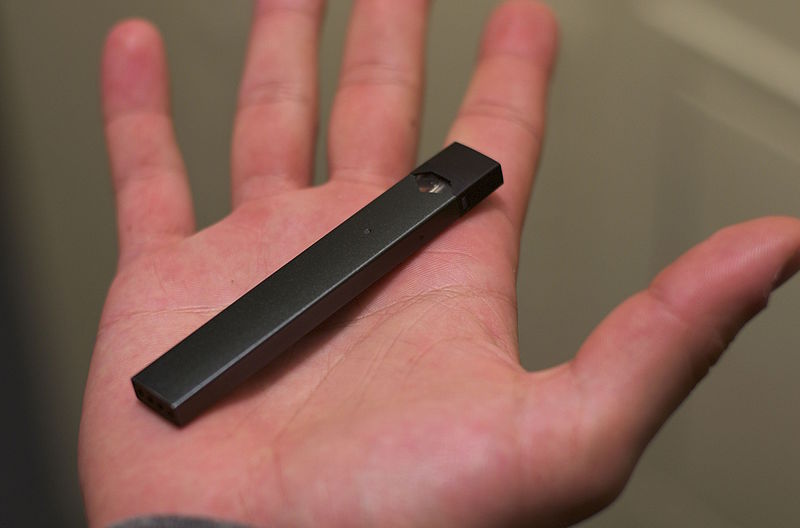
A few weeks ago, I was walking out of the bathroom by the main gym and I saw a piece of paper on the wall that read: “IT’S NOT CUUL TO JUUL IN SCHUUL.”
I thought that this was very ironic, coming just days after GM Principal Mr. Matt Hills sent out an email to families regarding the use of Juuls, a common e-cigarette brand, to all parents of students at George Mason High school.
Mr. Hills’ message, sent out via his “Principal’s Newsletter,” addressed specifically the rise in the use of electronic cigarettes throughout the student body on and off school premises. The habit is on the rise with teens all across the country.
The juul is a particular brand of e-cigarettes, which works by vaporizing a liquid that consists of vegetable glycerin, propylene glycol, natural oils, benzoic acid, and nicotine in order to wean adult smokers off of cigarettes. Juuls look like USB sticks and are therefore very concealable.
Vaping itself is a teenage phenomenon sweeping across the nation. A study done in 2015 by the CDC stated that 11.3 percent of high school students were active e-cigarette users and that two million middle and high school students actively use cigarettes. According to the New Scientist, between 2011 and 2015, the number of teens vaping has increased by 900 percent. While vaping is on the rise, a major problem is that teens don’t realize the health risks that come with the fast growing new trend.
What was made to stop adults from smoking cigarettes has done the opposite and hooked teens on the harmful chemical nicotine.
“Juuls were created to stop those who smoke cigarettes to break their bad habits,” said a freshman at George Mason who asked to remain anonymous. “Now it is taking off within teens as a cool way to impress their friends and they don’t understand the long term effects of juuling.”
Senior Ann Newburn agreed that juuling is a probably a passing popular trend. “There’s always something,” Newburn said. “[The people juuling] think they’re cool.”
And yet, some students share a belief that this might be a positive trend.
“If the Juul wasn’t created, kids would be smoking cigarettes and other drugs that are more harmful for their body and mental development,” said another freshmen at George Mason who also preferred to remain anonymous.
“There are worse things,” said junior Casandre Rice. “It’s not the best thing… they can be pretty addictive, but no one’s going to die from juuling.”
It is true that Juuls, like other e-cigarettes, don’t have tobacco, which is extremely harmful to the human lungs.
George Mason has encountered several instances of students using electronic cigarettes in the bathrooms and hallways.
As a matter of fact, after my meeting with Mr. Hills, on my way out of the office, he raised his hand while holding a charging device for the juul, which he had just found on the floor.
“Teachers are becoming more vigilant in the community,” Mr. Hills said, in regard to awareness in the building of this phenomenon. Administration has worked to make teachers and staff aware of what these look like and how to spot them.
Mr. Hills stressed that nicotine and e-cigarettes in any form are still harmful to students and their mental development. Despite the growing trend, Mr. Hills believes that it will die down by the summer.
Besides the health risks, e-cigarettes are still not allowed on school property. If a student gets caught vaping in the bathrooms or the hallways, the consequences will either be an in-school or out-of-school suspension. In addition, students will be suspended for 30-days from extra-curricular activities and may face some sort of suspension or expulsion from the team or club.
“We updated the school board policies about e-cigarettes and have placed in a set list of consequences that the [student] may face,” Hills said.
The updated “Former FCCPS Policy”, section 8.27 and 9.37, titled “USE OR POSSESSION OF TOBACCO,” now reads: “Students are prohibited from possessing electronic cigarettes or nicotine vapor products (as defined by the Virginia Code) on school buses, on school premises and at school-sponsored activities.”
Vaping not only has physical health risks, but it also brings mental health risks. According to www.Lung.com, some e-liquids have the chemical diacetyl. Diacetyl is included in the solution or e-liquid that is placed in the tank of the e-cigarette which has been linked to “popcorn lung”, a serious lung disease. In most e-cigarettes, ultrafine particles are inhaled deep into the lungs which can hurt the user and their lungs. Other e-liquids, according to Dr. Konstantinos Farsalinos, a clinical researcher on e-cigarettes, have cancer causing chemicals that are very harmful to the bloodstream.
And, of course, there’s nicotine, an addictive drug that alters the development of the brain, the brain circuits, and the brain’s reward system. Not only does nicotine hurt the brain, but it also can lead to intense mood swings and permanent problems with self control.










Max Miller • Apr 6, 2018 at 1:02 PM
what if I think it’s cuul to juul in schuul?